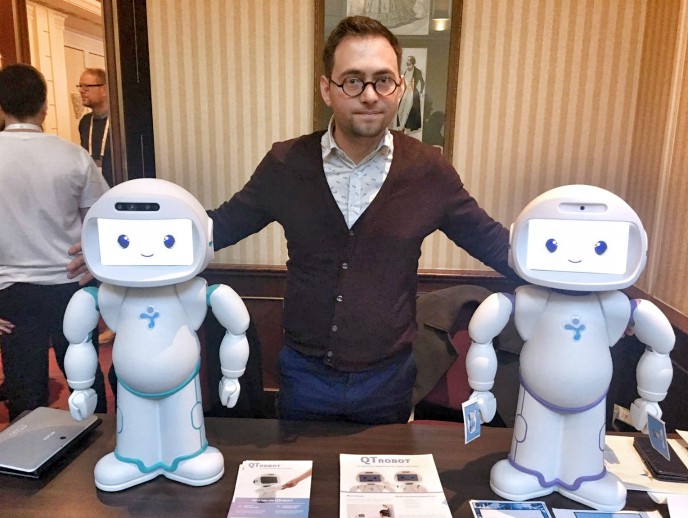CORDIS at the European Robotics Forum 2019: How robots are increasingly present in the healthcare sector
As discussed in the opening editorial for our special feature on robotics in the latest Research*eu magazine, robots are fast finding their way into many sectors of our society. One of them is our healthcare sector due to Europe’s ageing population where innovative solutions will be needed to care for them. But it isn’t just in caring for the elderly where robots will make a valuable contribution to our future healthcare and this was evident when walking around the dedicated exhibition space at the 2019 edition of the European Robotics Forum where the robots that most impressed your writer was those that have been developed to address specific healthcare needs. QT helps children with autism Indeed, the very first robot that your writer engaged with was the QT robot that has been developed at the University of Luxembourg to help children with autism better develop their social and emotional skills (you can see QT in the photo accompanying this article!) What makes QT so exciting is that ‘social’ robots are effective tools to make healthcare and education more accessible and are designed to be accessible for non-robotics specialists. As demonstrated in Bucharest, QT helps children through a series of games – you hold up a card to that shows a particular emotion (happiness, disgust etc.) and QT emulates the emotion and gives a short, easy-to-understand explanation of when you may be expected to feel that emotion. Currently QT is being used in Luxembourg, Belgium, France and Germany, and is a part of the EU-funded SecureIoT project and has also received funding through the SME Instrument in the QTrobot project. A robotic addition to the electric wheelchair Another innovation that left its mark on your writer was a new robotic arm that is specially designed to be integrated into electric wheelchairs, designed by the company ACCREA that was also a part of the now-closed EU-funded RAMCIP project. For their latest innovation, the robotic arm can be used by the wheelchair-bound patient as essentially a third arm which is flexible enough to be able to do many everyday things, such as opening doors and picking items up. To help users easily get to grips with controlling the arm, it’s controlled through a similar joystick function that is employed already in most electric wheelchairs. With a German industry partner, ACCREA are currently testing their robotic wheelchair arm with real users and a wider market entrance is expected soon! Robotics for cancer and neurological conditions Finally, we also interacted with researchers from the EU-funded ENDOO project, which opened our eyes to the fact that robots are also being developed to assist in primary care diagnosis and treatment. In ENDOO’s case, the project is developing an integrated robotic platform for the navigation of a soft-tethered colonoscope capable of performing painless diagnosis and treatment with colorectal cancer in mind, one of the major causes of mortality. The EXTEND project meanwhile, which will continue until 2022, is aiming to take the next step in developing the concept of the Bidirectional Hyper-Connected Neural Systems (BHNS) to extend the capabilities of neural interfaces with minimally invasive communication links between multiple nerves in the body and multiple external devices. As a part of this, they are developing a neuromusculoskeletal exoskeleton that would be of huge benefit to patients with spinal chord injuries. So if there’s one thing your writer has learnt through his attendance to the Forum – whoever you are, whatever your ailment or condition, very soon your treatment and follow-up care team could very well include a sophisticated, high-tech robot!
Countries
Belgium



